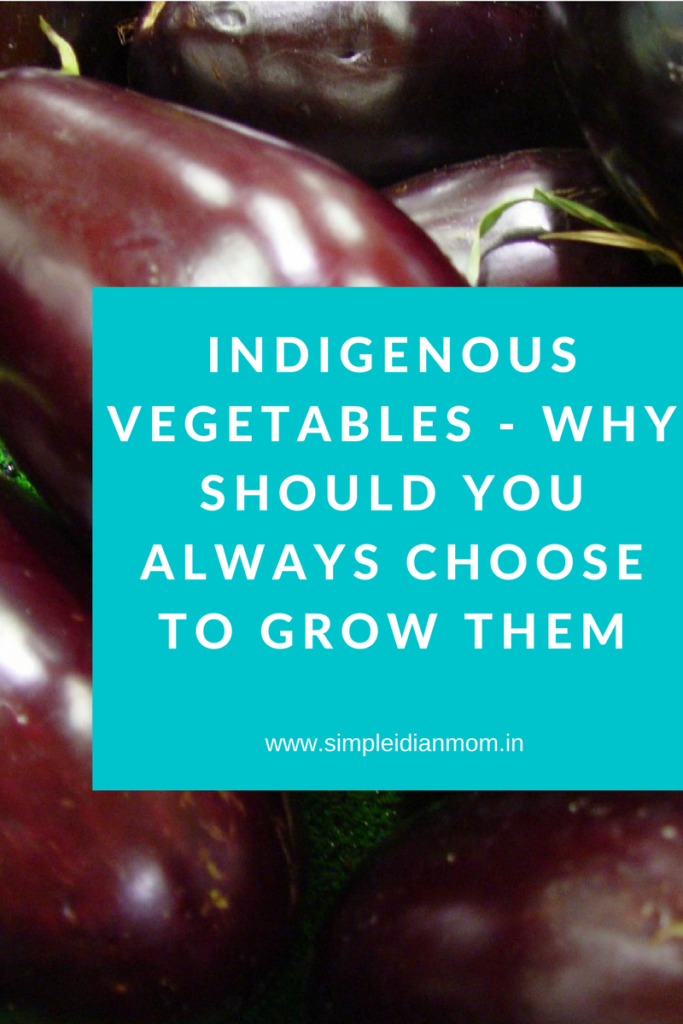Blog
Indigenous Vegetables – Why Should You Always Choose To Grow Them
Indigenous Vegetables or the native vegetation is what we are going to look up to today!
Today when you go to the market, you can easily get exotic fruits and vegetables, which neither grow in our weather nor in the season. However, they look fresh and colourful.
Off late we are so much into look (like fairness of skin) that we dont mind where the actual food comes from or how it is transported to such far away places and yet is maintained so fresh.
Any mall today has wax coated apples any day!
Oranges look like oranges but taste like mosambi!
Bers have paved way to apple ber!
local fruits have become nonexistent, or exists only in ayurvedic shops – our amla and guava have become medicines.

Indigenous Vegetables – Why Should You Always Choose To Grow Them
And vegetables have become zuccunis, baby corn, sweet corn, colour capsicums, beets and what not!
I would like to reiterate this – suppose you harvest tomato today, how long can you keep it fresh?
Not more than a couple of day, however we are now buying packed food vegetables and food that are at least a month old, yet look fresh.
High time we wake up friends – go to indigenous vegetables and fruits. Here is why you need to do it – Immediately.
Read the earlier posts
Need To Go and Grow Indigenous Vegetables
Indigenous vegetables have evolved with your local weather and climate over time, hence they are accustomed to local conditions so as to retain maximum nutrition (not for humans but for themselves which we can use too)
Native Vegetables Save Water
Native vegetation adapt themselves to the water available and the soil type that is present in your locality.
When you plant native varieties of veggies in your organic vegetable garden you will need to irrigate less compared to exotic and hybrid varieties.
You also do not have to treat the water, just your kitchen waste water and other waste water is enough for them.
Easy Maintenance
Indigenous vegetable crops require less to no maintenance whatsoever you usually hybrids require. You can use organic fertilizers, pesticides and other easy crop management activities to grow these vegetables.
You will get some very tasty organic vegetables spending lesser time and paying lower prices.
Less Pesticide Use
Native vegetables are adept to the pests present in the locality and hence know how to safeguard themselves from them. Also, since you are not using any chemical pesticides, other natural enemies of pests which do not harm the crop will take care of the pests.
This is not possible with some exotic hybrid varieties.
Support Local Ecology
This is a point that is always close to my heart – Save your ecosystem.
Did you know there are some very tasty and completely authentic tasting vegetables that go by their name. Wondering what I am telling you?
Well do chillies taste like chillies these days, I have some varieties that can fruit like a hundred chillies per plant but are bitter and not hot.
There are brinjals which are huge and no taste at all.
Go local, go native and you would just find how much you have been missing all these days. There is one variety of ladies finger (yay! I have them in my garden) which are so tiny yet tastes heavenly.
Your local ecosystem plays magic by spraying the right amounts of juiciness, taste and nutrients into the veggies.
Time and again my concern has been how much corporate have misled us – from what we wear to what we eat. We now feel having a cup of sweet corn in a big mall as fashion when all that it has is extra sugar and a lot of protective chemicals.
VARIETIES OF VEGETABLE CROPS THAT CAN BE GROWN IN INDIAN CONDITIONS
|
1. Amaranthus
|
20. Dolichos bean
|
|
2. Annual moringa
|
21. French beans
|
|
3. Ash gourd
|
22. Garlic
|
|
4. Beet root
|
23. Greater yam
|
|
5. Bhendi
|
24. Moringa beans
|
|
6. Bitter gourd
|
25. Onion
|
|
7. Bottle gourd
|
26. Palak
|
|
8. Brinjal
|
27. Peas
|
|
9. Butter beans
|
28. Potato
|
|
10. Carrot
|
29. Pumpkin
|
|
11. Cauliflower
|
30. Radish
|
|
12. Cerely
|
31. Ribbed gourd
|
|
13. Chakravarthikeerai
|
32. Snake gourd
|
|
14. Chilli
|
33. Spinach
|
|
15. Coccinia
|
34. Sweet potato
|
|
16. Coleus
|
35. Tapioca
|
|
17. Colocasia
|
36. Tomato
|
|
18. Cowpea
|
37. Watermelon
|
|
19. Cucumber
|
I shall give more details about these vegetables one by one so you will know exactly know how to go about growing your own organic vegetables.
Essential Equipment and Tools You Require to Grow Your Own Organic Vegetables

